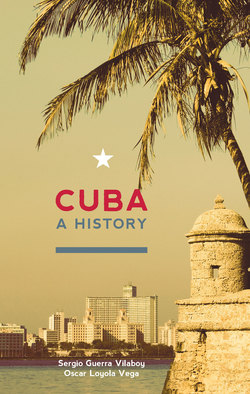Cuba: A History

Реклама. ООО «ЛитРес», ИНН: 7719571260.
Оглавление
Sergio Guerra-Vilaboy. Cuba: A History
Отрывок из книги
SERGIO GUERRA VILABOY holds a Ph.D. in philosophy from the University of Leipzig. He is head of the History Department at the University of Havana and is executive secretary of the Association of Latin America and Caribbean Historians. He is also on the editorial boards of several magazines, including Tzintzun and Ulúa (Mexico), Investigación y Desarrollo (Colombia), Kó-Eyú Latinoamericano (Venezuela) and Contexto Latinoamericano (published by Ocean Sur); he has given talks at a number of universities; and has written several books, including Paraguay: de la independencia a la dominación imperialista (1991), Los artesanos en la revolución latinoamericana (2000), El dilema de la independencia (2000), Cinco siglos de historiografía latinoamericana (2003), Historia de la Revolución Cubana (2005), Breve historia de América Latina (2006) and Ernesto Che Guevara (2007).
OSCAR LOYOLA VEGA holds a Ph.D. in history and was deputy dean of the School of Philosophy and History at the University of Havana between 1993 and 1997 and presided over its Doctoral Commission. He has given talks at universities in a number of countries and co-authored several books, including La Guerra de los Diez Años (1989), Cuba y su historia (1999) and Historia de Cuba 1492-1898. Formación y liberación de la nación (2001).
.....
The island was also divided into two administrative regions: Santiago de Cuba and San Cristóbal de La Habana, with the former subordinated to the latter. Trinidad, Sancti Spíritus and San Juan de los Remedios, the settlements in the middle of the island, were not included in either of these regions, so their inhabitants enjoyed some autonomy for decades. Spain exercised control through such laws as the Cáceres laws, promulgated by Judge Alonso de Cáceres in 1574, which regulated many aspects of Cuba’s economic and social life.
The Spanish fleets promoted urban development in Havana, such as the construction of the Main Parish Church between 1550 and 1574 and the Monasteries of Santo Domingo and San Francisco in 1578 and 1584, respectively, and the plan for the Royal Canal in 1592 to provide the settlement with water. There was little progress elsewhere, and only two more important settlements were founded some time later in Santa Clara and Matanzas.
.....